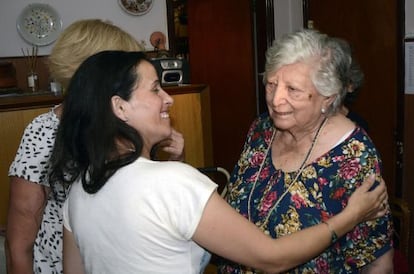DNA test reveals Argentinean woman lied about stolen baby claims
False alarm for Plaza de Mayo grandmother, as stranger shows up claiming to be relative


María Isabel Chorobik de Mariani, who is better known by her nickname Chicha, is one of the founders and former presidents of the Grandmothers of the Plaza de Mayo. For 39 years, she has searched for the granddaughter who was taken away by officials from the past Argentinean military dictatorship (1976-1983) when the infant was only three months old.
Chicha has searched for her everywhere, even writing open letters on Facebook last year when she turned 91.
The stranger showed up with the results of a DNA test she had performed in a private clinic
On Christmas Eve, a young woman went to visit Chicha at her home in La Plata. Now 92, the grandmother has almost lost her eyesight.
The stranger, who claimed to be Clara Anahí Mariani, showed up with the results of a DNA test she had performed in a private clinic in Córdoba, which purportedly concluded that there was a 99% chance that she was her granddaughter.
News of the encounter was celebrated across Argentina. Of the 500 missing cases the Grandmothers of the Plaza de Mayo have on record, she was the 120th lost grandchild to be found by the organization.
Even President Mauricio Macri, who has an estranged relationship with the Grandmothers of the Plaza de Mayo, praised the reunion on his Twitter account. “Happy over the discovery of the 120th grandchild. It’s a victory in the search for truth and in the defense of the right to an identity,” he wrote.
But the bad news came on Christmas Day when, after performing two DNA tests, the National Genetic Data Bank reported that the young woman was not related to Chicha. The results were released on Facebook by the Clara Anahí Foundation, which Chicha had set up to help find her missing granddaughter.
Chicha had been cautious. In photos taken by the press with the young woman, the elderly woman is barely smiling.
On Christmas Day, she went to court along with her lawyers. Before a judge and officials from the National Commission for the Right to an Identity, Chicha found out that the young woman who appeared at her doorstep had already had a DNA test taken by the National Genetics Bank, which told her in June that she doesn’t match any of the DNA records, including those of Chicha’s family.
The young woman had not told Chicha about any of that. Another test was performed this past Friday, which also turned up negative.
The real Clara Anahí was the daughter of two members of the Montoneros, a Peronist urban guerrilla group that terrorized Argentina before the military takeover.
The real Clara Anahí was the daughter of members of a Peronist urban guerrilla group
When the father went out one morning from his home in La Plata in 1976, he left behind his three-month-old daughter, the baby’s mother and four other members of the Montoneros.
Some hours later, police raided the home, killing Clara’s mother, Diana Teruggi, and the other four. The baby, who survived the shootout, was taken by the police and given to another family.
Since then, Chicha and her son, Daniel Mariani, have searched for the baby. In 1977, Mariani was murdered by the dictatorship and Chicha was left to continue her search.
She became one of the 12 founding members and later president of Grandmothers of the Plaza de Mayo. But in 1989, she left the organization after a dispute with other members.
In 1996, she founded the Clara Anahí Foundation to continue her search.
I cannot permit myself to die just yet; I need to find my granddaughter” Chicha Chorobik de Mariani in 2007
Eleven years later, she testified at the trial of Miguel Etchecolatz, the police commissioner who took part in the raid at her son’s home.
“I cannot permit myself to die just yet; I need to find my granddaughter,” she testified at the trial.
After years of a fruitless search, Chicha last year began writing open letters on Facebook alongside photos of the three-month-old baby.
“My dear granddaughter, my dear Clara Anahí. I am your grandmother,” she wrote in one of her letters. “Even though they tried to convince me that you died in the shootout, I have always known that you are alive.
“At 91, my hope is to hug you and for you to recognize me when you see me. I would like for you to come to me so that this long search can end.”
But for Chicha, the search continues.
English version by Martin Delfín.
Tu suscripción se está usando en otro dispositivo
¿Quieres añadir otro usuario a tu suscripción?
Si continúas leyendo en este dispositivo, no se podrá leer en el otro.
FlechaTu suscripción se está usando en otro dispositivo y solo puedes acceder a EL PAÍS desde un dispositivo a la vez.
Si quieres compartir tu cuenta, cambia tu suscripción a la modalidad Premium, así podrás añadir otro usuario. Cada uno accederá con su propia cuenta de email, lo que os permitirá personalizar vuestra experiencia en EL PAÍS.
¿Tienes una suscripción de empresa? Accede aquí para contratar más cuentas.
En el caso de no saber quién está usando tu cuenta, te recomendamos cambiar tu contraseña aquí.
Si decides continuar compartiendo tu cuenta, este mensaje se mostrará en tu dispositivo y en el de la otra persona que está usando tu cuenta de forma indefinida, afectando a tu experiencia de lectura. Puedes consultar aquí los términos y condiciones de la suscripción digital.








































